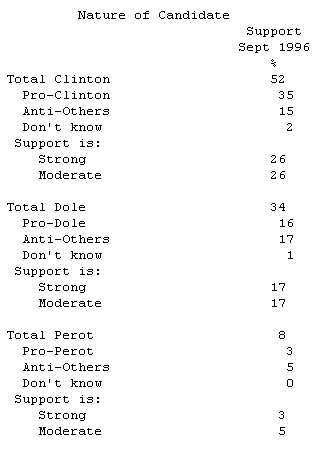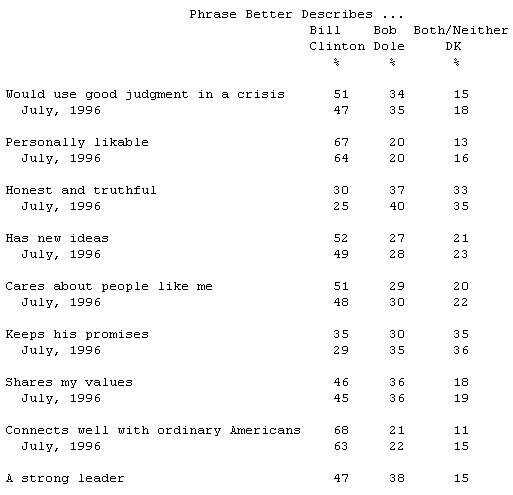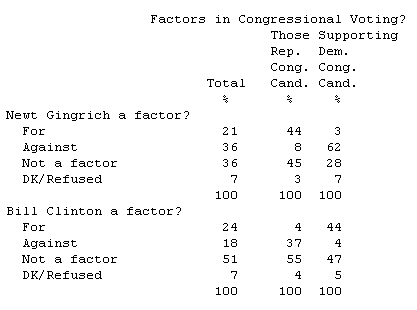Introduction and Summary
As the fall campaign begins, Bill Clinton holds a solid lead over challengers Bob Dole and Ross Perot. But the race for control of Congress remains close. While the Democrats have gained some ground on the GOP over the course of the summer, American voters have a more positive view of incumbents than they did two years ago and the Congressional vote seems more dependent on local matters than in 1994.

At the top of the ticket, Clinton’s lead is impressive. Not only do more voters now back him than did in mid-summer, but a greater proportion say they would be casting a vote for Clinton rather than against Dole and Perot, if the election were being held today.
The latest Pew Research Center survey finds 52% of a national sample of registered voters saying they would vote for Clinton, compared to 34% for Dole and 8% for Ross Perot. Six weeks ago, prior to the political conventions, Clinton led by a significantly smaller margin (44% vs. 34% and 16%, respectively). In the current survey, half of Clinton backers say they support him strongly and most say they are voting for him, not against his opponents.
In contrast to Clinton, the net effect of the conventions has been to weaken Dole’s position. While half the GOP candidate’s backers say they strongly support him, much of his backing is based on opposition to Clinton and Perot. More ominously, the proportion of voters saying that they have decided definitely not to vote for the former Senate majority leader has risen from 40% in late July to 47% in the current poll. Four years ago, a Center survey found about as many voters (44%) saying they had definitely decided not to vote for George Bush who then trailed Clinton by 15%. By way of comparison, no fewer than 78% of respondents in the new survey have firmly decided against voting for Ross Perot.
Despite a short-lived post convention bounce, Dole has not rallied the expected numbers of Republicans to his side. Only 81% of Republicans and 59% of Independents who lean Republican back him. Clinton gets 90% of Democrats and 79% of Independents who lean Democratic.
Dole has gained no ground either with regard to his personal image or perceived abilities relative to Clinton. As was the case prior to the conventions, Clinton is picked over Dole as personally likable and connecting well with ordinary people by margins of 3 to 1 or better. The President is chosen over his challenger by nearly 2 to 1 for having new ideas and caring about people. Clinton is also graded better than Dole for using good judgement in a crisis, sharing the voter’s values and for being a strong leader. Dole barely rates better than Clinton on character dimensions. A slim plurality of respondents (7 percentage points) choose Dole over Clinton for being honest and truthful, and about equal percentages select the two candidates for keeping promises.

Generally, the President has a lesser advantage on abilities than on personal characteristics. But he wins over Dole by significant pluralities on seven out of eight performance dimensions. The exception is that Dole is credited as potentially better able to cut taxes (by a 42% to 34% margin). Essentially the same proportion favors Clinton as Dole for balancing the budget (41% and 38%, respectively). By a 57% to 29% margin, voters have more confidence in Clinton to improve education, which is typically a Democratic strength, but they also favor him over Dole for protecting and strengthening families (50% to 36%), normally a GOP strong point.
Compared to late July, Clinton enjoys a slightly wider margin over Dole for improving economic conditions (49% to 35%), reflecting voters’ views about abortion (46% to 28%), and making wise decisions about foreign policy (44% to 39%). Despite Dole’s attacks on Clinton following the release of a government report indicating increased drug use among teens, voters think that the President is better able to deal with the drug problem than his opponent (44% to 32%).
Republican Defectors
Underscoring Dole’s problem with defections from the GOP, significant percentages of Republicans and Independents who lean Republican have more faith in Clinton than in their party’s standard bearer to improve education and to better represent their views on abortion. The desertion pattern is even more striking on the personal dimension. By margins of almost 2 to 1, Independents who lean Republican think that Clinton is more likeable than Dole and connects better with ordinary people.
Clinton’s gains in support since mid-summer have been greatest among Independents. His lead among Independents who lean Democratic has increased, while at the same time he has retained his pre-convention margin among Independents who lean Republican.
Demographically, the President also polls much better than six weeks ago among younger voters, whites, and middle and lower income groups. He also gained support among white evangelical Protestants over this period, but Dole continues to lead among this largely Republican, socially conservative group. Clinton has a comfortable lead among white Catholics and a smaller yet significant one among white mainline Protestants.
Dole support has increased since late July only among one sizeable demographic group — white Southern men. Clinton, in contrast, has gained support among white men outside the South and among white women in all parts of the country in the past six weeks.
Democratic Gains
As Clinton’s lead has increased, support for his party’s Congressional candidates also has grown somewhat. Voters in the Pew Research Center sample were inclined to vote for Democrats over Republicans in House races by a margin of 51% to 43%, up from 47% to 46% in late July. But a number of crosscurrents undercut that small lead. In particular, the poll found much more support for incumbents than two years ago. Fully 62% of respondents said they would like to see their own incumbent Congressional representative reelected compared to 49% in early October 1994. Similarly, while that same 1994 survey found a strong majority of 56% to 28% against the reelection of most members, voters in the current survey divided 43% to 43% on this question.
Voters are also more inclined than two years ago to say that local issues will make the biggest difference in how they vote in their district (42% vs. 27%). In the current survey, only 18% said that national issues would have the largest bearing on their choice. Most respondents (51%) said Clinton would not be a factor in their vote for Congress. Of those who said he would be a factor, votes for his party’s candidate slightly out weighed votes against (24% vs. 18%). Two years ago that margin was reversed (17% for to 23% against ).
An Eye On Newt
Newt Gingrich may be more of a factor than Clinton in the battle for Congress. Fully 57% of respondents said he would be a consideration in their vote. More than half of them (36%) said they would be voting against the speaker, compared to 21% who said they will be voting for him. Gingrich in this way threatens to be a greater negative for the GOP than Clinton would be a positive value for the Democrats. For example, both Clinton and Gingrich are cited as positive factors by 44% of respondents who will vote for the Democratic and Republican Congressional candidates, respectively; but fully 62% of those backing Democrats said they were voting against the Speaker and only 37% of those voting for Republicans said they were voting against the President.

Gingrich’s unpopularity may be diluted to some extent by support for the idea that the Presidency and the Congress should not be in the hands of the same party. Many believe that if Clinton should win, it would be better if the GOP controls Congress. Republicans put a higher priority on keeping control of the legislature than do Democrats (86% vs. 77%), with Independents tending to favor GOP rather than Democratic control (46% vs. 42%).
Flagging Interest
Given the closeness of the Congressional race and conflicting voter attitudes, turn out may be a decisive factor. And it may well work to the GOP’s advantage. Measures of interest in the campaign and turnout indicators are significantly lower than they were four years and even eight years ago. Only 48% of respondents said they have given a lot of thought to the presidential election, compared to 63% in September 1992 and 57% in September 1988. In the new poll, just 24% said they were paying close attention to campaign news compared to 42% in September 1992.
Analysis suggests that lower turnout would help both Dole and perhaps more meaningfully, Republican Congressional candidates. Support levels are shown below for all registered voters, for likely voters if turnout is comparable to 1992, and for likely voters if turnout is comparable to 1988.

One-Worders For Kemp and Gore
One word descriptions of the vice presidential candidates indicate that the public sees both men, incumbent Al Gore and challenger Jack Kemp, in mostly positive terms. Gore was most often called “intelligent;” Kemp’s list led with “football.” In second place for both men was “good.” In comparison, the public in August offered a mix of positive and negative words for Clinton, led by “good” and “wishy-washy.” Dole was most often described in terms of his age, “old,” then “good.”



